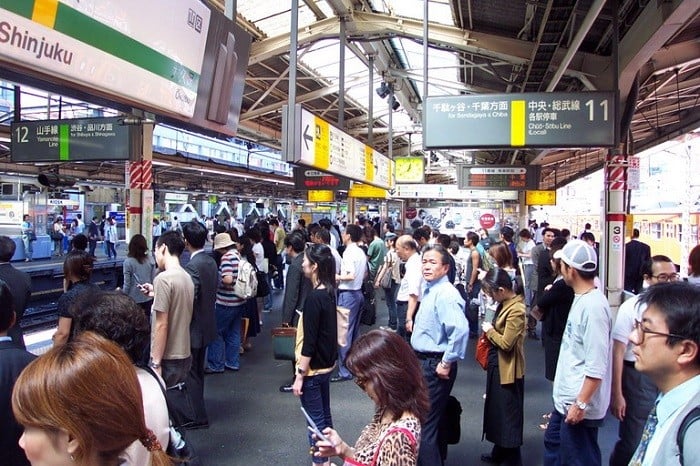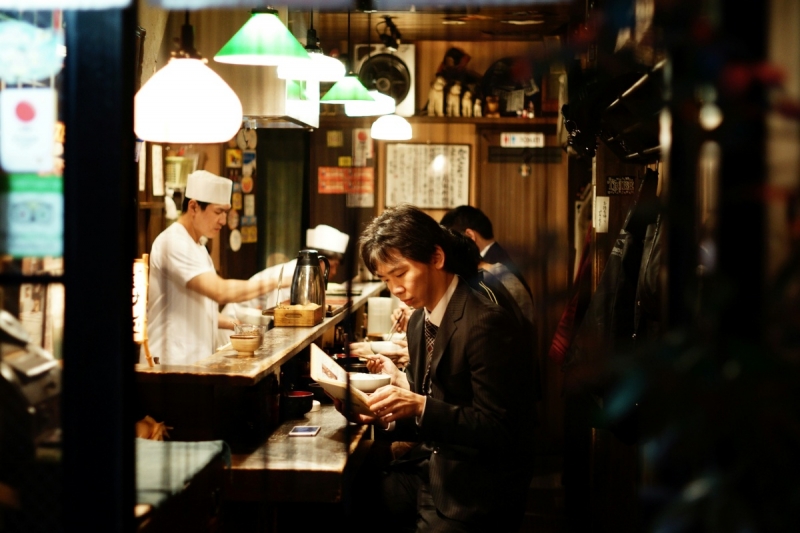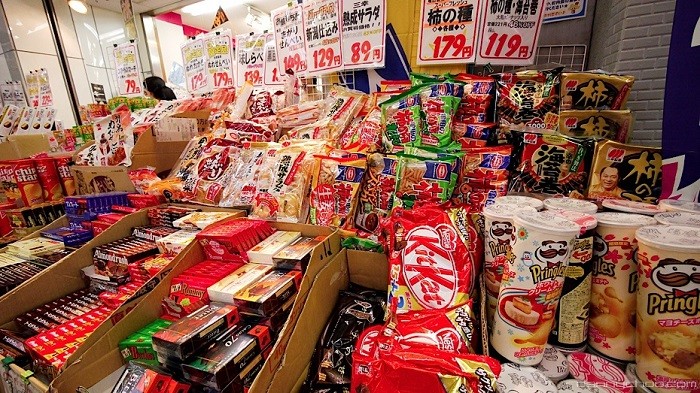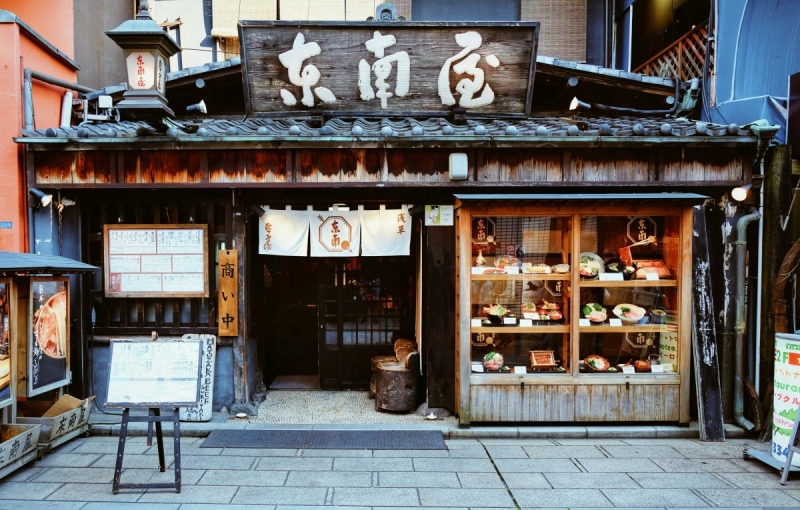Travelling around Japan without any knowledge of Japanese is not impossible. However, after spending five months in Japan, I discovered that it’s really not as easy as one would think.
While many tourist spots in Japan have English signboards and directories, being able to speak a sentence or two in Japanese would prove to be a BIG BONUS to travellers.
Based on my personal experience, to survive in Japan (yes, just survive), travellers should know a few simple words. Take the next fifteen minutes to memorise these easy yet extremely useful words – because you will be using them daily in Japan. You’ll thank me later.
1. Arigatou

Image credit: picdrops | Flickr
I know you know arigatou (which means thank you) very well, which is great. Being polite is a plus anywhere in the world, but in Japan, it will be a BIG PLUS. Say arigatou when someone hands you free tissue on the street, when the waiter in the restaurant brings your food to you, when you are lost and a kind Japanese shows you the way by personally bringing you to your destination (yes, this happens a lot). Rule of thumb, say thank you – I mean arigatou – to everyone when they do something nice for you.
2. Sumimasen
When travelling, there will be instances when you feel slightly bad to trouble a kind soul who is helping you out. This happens, say, when a friendly Japanese goes out of the way to bring you to the train station, despite him/her being in a hurry. On the way to the train station, it would be very awkward if silence hangs in the air, and slightly less so if you keep nodding your head and saying arigatou.
So now, the second magic word comes in. You can say sumimasen, which means ‘sorry to trouble you’. So with the help of the friendliest stranger you have ever met, you board the right train on time. There is no doubt that trains in Japan, especially in big city like Tokyo, are always crowded, and very often you will be stuck in the middle of the crowd when you need to alight. You don’t want be rude but the door is closing soon. Use sumimasen again – here it means ‘excuse me’. Or if you are up for a challenge, say sumimasen, orimasu, which means ‘excuse me, I am getting off at this stop’.
3. Onegaishimasu

Image credit: Alva Pratt | Unsplash
Scene changes. You are in a restaurant now. You are lucky to have found a Japanese restaurant with English menu, and the best part is, they have pictures on the menu! The waiter is here, and you want to place your order. Point to the food (the name or the picture) you want, use your fingers to let them understand how many bowls of tonkotsu ramen you want, and last but not least, say onegaishimasu. It means ‘please’. The surprised waiter will appreciate your effort at speaking Japanese. Basically, say onegaishimasu when you want to ask someone for a favour. You can also say sumimasen, onegaishimasu if you want to call the attention of the waiter in the restaurant.
4. Okaikei onegaishimasu
After finishing your meal, you need to pay for your food. Just say sumimasen, okaikei onegaishimasu, which means ‘excuse me, bill please’. You see, now you know four words, but you can handle more than four situations with the combination of these words. How convenient and efficient!
Bonus: For all those who wants to appear like a professional Japanese speaker, say gochisousama when you are about to leave the restaurant. It’s meant to express appreciation to the chef for the delicious meal.
5. Konnichiwa
Greetings! Oh yes, you should greet whenever you meet someone. Say konnichiwa, which means ‘hello, good day’. Konnichiwa can be used at all times of the day – though if you want to put in more effort, you can also learn to say ohaiyou (good morning) and konbanwa (good evening). Otherwise, you can always start your Japanese conversation with a slight nod and konnichiwa.
6. Wakarimasen
When you don’t understand something, it’s better to admit it rather than pretend that you do. Say sumimasen, wakarimasen which means ‘I am sorry, I do not understand’. When you say this, the recipient will either try harder to explain or direct you to someone who speaks English. The way to get help is to let people understand your needs.
7. Dokodesuka

Image credit: Danny Choo
When you want to ask for directions, say sumimasen (excuse me), show them the name or the picture of your destination, and say dokodesuka, which means ‘Where is this place?’ They will understand that you are lost and need help. Don’t forget to say arigatou to the kind souls who try their very best to help!
8. Muryoudesuka
Cheapos like me love this last phrase the most: muryoudesuka, which means ‘Is this FREE?’ Yes, you definitely need this when you are shopping – for souvenirs, Japanese snacks or anything at all. When shopping for souvenirs, you might be handed a few pretty-looking wrapping bags; in fact, sometimes your souvenirs will be wrapped nicely for you. You might be wondering if that’s free because the wrapping paper looks more expensive than the souvenir itself (no joke). Lucky for us, it’s usually free, but there are exceptions, so it is always better to ask beforehand. The same goes for food sampling, free gifts and vouchers. Always ask. And never forget your arigatou even if you are not buying that yummy (and expensive) sakura-shaped cookie that the cute Japanese promoter girl gave you as a sample. She is still smiling at you. Don’t panic, say arigatou, and move to sample other snacks.
9. Konbanwa
Konbanwa literally translates to “Good evening” in Japanese and is a polite and common greeting used from late afternoon onwards, typically after around 6:00 PM. You can use “Konbanwa” in various situations, such as when greeting someone you encounter in the evening, answering the phone after 6:00 PM, or greeting someone upon entering a restaurant or store in the evening. It’s considered a polite and respectful greeting, suitable for use in most social situations.
10. Hai

Image credit: Cecelia Chang | Unsplash
Hai in Japanese simply means “yes.” It’s a common and direct way to express agreement or acknowledgement. Pronounced with a short, sharp sound, similar to a quick “high” in English, “hai” is a versatile word used in various situations, from casual conversations to more formal settings.
11. Iie
Iie in Japanese simply means “no.” It’s the most common and direct way to express disagreement or negation. It’s pronounced with a slightly drawn-out “ee” sound followed by a short “eh” sound.
While iie is the most direct way to say “no,” it’s important to note that Japanese culture often emphasizes indirectness and avoiding direct confrontation. Therefore, you might encounter other ways of declining offers or requests, such as “chotto” which means “a little” or “not really,” or “sumimasen ga…” which means “I’m sorry, but…”.
12. Itadakimasu
Itadakimasu is a deeply significant phrase in Japanese culture, uttered before commencing a meal. While often translated as “Let’s eat” or “Bon appétit,” its true meaning extends far beyond mere invitation. Itadakimasu translates to “I humbly receive,” conveying a profound sense of gratitude. This expression acknowledges the effort invested in preparing the meal, from the farmers who cultivated the ingredients to the cook who prepared it.
Saying “Itadakimasu” is a sign of respect, not only for the food itself but also for those who contributed to its creation. It’s a cherished custom in Japanese culture, often accompanied by a slight bow of the head, reflecting a deep appreciation for the nourishment and the interconnectedness of all beings involved in bringing the meal to the table.
13. Oishii

Image credit: Hardik Pandya | Unsplash
The Japanese word oishii translates to “delicious” and is a versatile expression of delight when enjoying food or drink. From indulging in a lavish meal at a Michelin-starred restaurant to savouring a humble street food snack, oishii perfectly captures your appreciation for any culinary experience.
14. Ikura desu ka
“Ikura desu ka?” directly translates to “How much is it?” or “What is the price?” in Japanese. This essential phrase is invaluable when navigating various shopping situations. Whether you’re browsing the vibrant markets for fresh produce and souvenirs, inquiring about the cost of a delicious meal at a restaurant, or seeking information about transportation or tour prices, “Ikura desu ka?” is your go-to phrase. It’s a polite and straightforward way to ask for the price of anything, ensuring smooth and efficient interactions during your travels in Japan.
15. Kudasai
Kudasai is a key Japanese word that means “please” and is commonly used to make polite requests. For example, you might say Mizu kudasai to ask for water at a restaurant. Typically, kudasai is used when speaking to friends, peers, or those of similar or lower status. This simple yet essential word helps ensure your requests are polite and respectful in everyday interactions.
It’s important not to confuse kudasai with onegaishimasu, even though they both translate to “please” in English. Kudasai is more direct and is generally used when requesting an object or action. On the other hand, onegaishimasu is broader in scope and conveys a polite request or plea, often for a service or favour.
Also read: 20 Essential Tips for Your First Time in Japan
So there you have it — a list of useful Japanese phrases for your next trip to the Land of the Rising Sun! Don’t forget to practise the combinations as well. Did I just hear someone say arigatou because I saved your ass in Japan? Oh well, doitashimashite (you’re welcome).




